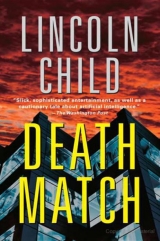
Текст книги "Death Match"
Автор книги: Lincoln Child
Соавторы: Lincoln Child
Жанр:
Триллеры
сообщить о нарушении
Текущая страница: 5 (всего у книги 26 страниц)
NINE
Southern Westchester County Medical Center was a cluster of brick buildings on the outskirts of Rye, just over the New York border. As Lash screeched into the ambulance entrance, he could see that the ER was unusually quiet. Just two vehicles sat together in the shadows beyond the glass admitting doors. One was an ambulance; the other a long, low, hearse-like vehicle bearing the seal of the county medical examiner. The rear doors of the ambulance were open, and as Lash trotted across the blacktop he glanced toward it. An EMS technician was at work with a bucket and sanitizer, swabbing the interior. Even from twenty yards Lash caught the coppery tang of blood.
The smell brought him up short, and he glanced hesitantly up at the building’s dark-red bulk. He had not been inside an emergency room in three years. Then, recalling the urgency in Mauchly’s voice, he forced himself forward once again.
The waiting area seemed subdued. Half a dozen people sat in plastic chairs, staring vacantly at walls or filling out forms. A small knot of policemen stood in one corner, talking among themselves in low tones. Quickly, Lash headed for the door marked SQUAD ROOM, opened it, felt along the wall for the button that opened the automatic doors into the emergency room.
The doors whispered open onto a far different scene. Several orderlies were at work, scrambling with equipment trays. A nurse walked by, liters of blood clutched in her arms. Another followed with a crash cart. Three EMS technicians were standing at the nurses’ station, not speaking. They looked dazed. Two were still wearing pale-green gloves heavily smeared with blood.
Lash scanned the area for a familiar face. Almost instantly he spotted the chief resident, Alfred Chen, walking toward him. Normally, Chen moved with the slow, stately grace of a prophet, a smile on his Buddha-like face. Tonight, Chen was moving quickly, and the smile was gone.
The resident’s eyes were on a metal clipboard in his hands, and he didn’t bother looking up at Lash. As Chen passed, Lash stuck out an arm. “Alfred. How’s it going?”
Chen stared blankly for a moment. “Oh. Chris. Hi.” The smile made a brief appearance. “Could be better. Listen, I—”
“I’m here to see the Wilner couple.”
Chen looked surprised. “That’s where I’m headed. Follow me.”
Lash swung in beside the resident.
“Are they patients of yours?” Chen asked.
“Prospective.”
“How’d you hear about it so fast? They just got here five minutes ago.”
“What happened?”
“Suicide pact, according to police. Pretty thorough job of it, too. Radial vein, opened lengthwise from wrist to forearm.”
“In the bath?”
“That’s the strange part. They were found in bed together. Fully clothed.”
Lash felt the muscles of his jaw tighten. “Who found them?”
“Blood came through the ceiling of the condo below theirs, and the owner called the police. They must have been there for hours.”
“What’s their condition?”
“John Wilner bled out,” Chen puffed. “Dead on the scene. His wife is alive, but just barely.”
“Any kids?”
“No.” Chen glanced down at the sheet. “But Karen Wilner is five months pregnant.”
Ahead, the nurse with the crash cart disappeared behind a drawn curtain. Chen followed, Lash at his heels.
The space beyond was so crowded that at first Lash could not see the bed. Somewhere, an EKG was bleating out a dangerously fast pulse. There was a torrent of voices, talking over each other, calm but urgent.
“Heartbeat’s at 120, out of sinus tach,” a woman said.
“Systolic’s at 70.”
An alarm sounded abruptly, adding its drone to the babel.
“Hang more plasma!” This voice was louder, more insistent.
Lash slipped along behind the blue-garbed figures, back against the curtain, working toward the head of the bed. As he squeezed into position between two racks of diagnostic equipment, Karen Wilner finally became visible.
She was like alabaster, so pale Lash could see an incredible tracery of starved veins around her neck, across her breasts, down the sweep of her arms. Her blouse and bra had been cut away, and her torso swabbed clean, but she was still wearing a skirt and it was here the whiteness ended. The fabric was soaked through with blood. Twin IVs, turned wide open, were notched into her inner elbows: one of plasma, the other of saline. Below these, tourniquets were placed around her forearms, and doctors were at work, trying to suture the ruined veins.
“We’ve got vasospasm,” said a nurse, one hand to the patient’s forehead. Karen Wilner’s eyes remained closed, and she did not respond to the pressure of the nurse’s hand.
Lash slipped in closer, knelt down beside the motionless face.
“Ms. Wilner,” he murmured. “Why? Why did you do it?”
“What are you doing?” the nurse demanded. “Who is this guy?”
The bleat of the EKG machine had slowed to a lazy, irregular rhythm. “Bradycardia!” a voice called. “Pressure’s down to 45 over 20.”
Lash drew closer. “Karen,” he said, more urgently. “I need to know why. Please.”
“Christopher, move away,” Dr. Chen warned from the far side of the bed.
The woman’s eyes fluttered open; closed; opened again. They were dry and even paler than her skin.
“Karen,” Lash repeated, placing a hand on her shoulder. It felt like marble.
“Make it stop,” she said, the words more breath than voice.
“Make what stop?” Lash said.
“That sound,” the woman replied, almost inaudibly. “That sound in my head.”
Her eyes slipped closed again, and her head lolled to one side.
“We’re losing her!” a nurse cried.
“What sound?” Lash said, bending closer. “Karen, what sound?”
He felt a hand land on his shoulder, pull him back. “Away from the bed, mister,” said an orderly. His eyes glittered black above the white gauze of his mask.
Lash retreated between the racks of equipment. The EKG was now droning a high, incessant note. The nurse scrambled forward with the crash cart.
“Charged?” asked Dr. Chen as he took the paddles.
“One hundred joules.”
“Back!” called Chen.
Lash watched Karen Wilner’s body stiffen as electricity coursed through it. The driplines hanging from the IV racks whipsawed violently back and forth.
“Again!” Chen cried, paddles raised in the air. For a moment, his gaze met Lash’s own. Brief as it was, the glance said everything.
With one final, searching look at Karen Wilner, Lash turned and left the emergency bay.
TEN
This time, when Edwin Mauchly ushered Lash into the Eden boardroom, the table was full. Lash recognized some of the faces: Harold Perrin, ex-chairman of the Federal Reserve Board; Caroline Long of the Long Foundation. Others were unfamiliar. But it was clear the entire board of Eden Incorporated was assembled before him. The only person missing was the company’s reclusive founder, Richard Silver: although the man had rarely been photographed in recent years, it was clear none of the faces assembled here belonged to him. Some looked at Lash with curiosity; others with grave concern; still others with an expression that was probably hope.
John Lelyveld sat in the same chair he’d occupied at the first meeting. “Dr. Lash.” And he waved at the sole vacant seat. Mauchly quietly closed the door to the boardroom and stood before it, arms behind his back.
The chairman turned to a woman at his right. “Stop the transcription, if you please, Ms. French.” Then he looked back at Lash. “Would you care for anything? Coffee, tea?”
“Coffee, thanks.” Lash studied Lelyveld’s face as the man made brisk introductions. The benevolent, almost grandfatherly manner of the prior meeting was gone. Now the Eden chairman seemed formal, preoccupied, a little distant. This is no longer a coincidence, Lash thought, and he knows it. Directly or indirectly, Eden was involved.
The coffee arrived and Lash accepted it gratefully: there had been no time for sleep the night before.
“Dr. Lash,” Lelyveld said. “I think everyone would be more comfortable if we got straight to the matter at hand. I realize you haven’t had much time, but I wonder if you could bring us up to speed on anything you’ve learned, and whether—” he paused to glance around the table “—whether there’s any explanation.”
Lash sipped his coffee. “I’ve spoken with the coroner and local law enforcement. On the face of it, everything still points to the original conclusion of double suicide.”
Lelyveld frowned. Several chairs away, a man who’d been introduced as Gregory Minor, executive vice president, moved restlessly in his seat. He was younger than Lelyveld, black-haired, with an intelligent, penetrating gaze. “What about the Wilners themselves?” he asked. “Any indications to explain this?”
“None. It’s just like the Thorpes. The Wilners had everything going for them. I talked to an emergency room intern who knew the couple. They had great jobs: John an investment banker, Karen a university librarian. She was pregnant with their first child. No history of depression or anything else. No apparent financial difficulties, no family tragedies of any kind. The autopsy bloods were clean. It will take a thorough investigation to be certain, but there seems no evidence to indicate suicidal tendencies.”
“Except the bodies,” Minor said.
“The evaluator at their class reunion here made a similar report. They seemed just as happy as the rest of the couples.” Lelyveld glanced at Lash. “You used the phrase ‘on the face of it.’ Care to elaborate?”
Lash took another sip of coffee. “It’s obvious the suicides in Flagstaff and Larchmont are related. We’re not dealing with coincidence. And so we need to treat these incidents as what, at Quantico, we termed ‘equivocal death.’ ”
“Equivocal death?” Caroline Long sat to his right, her blond hair almost colorless in the artificial light. “Explain, please.”
“It’s a type of analysis the Bureau pioneered twenty years ago. We know the victims, we know how they died, but we don’t yet know the mannerof death. In this case, double suicide, suicide-homicide – or homicide.”
“Homicide?” said Minor. “Just a minute. You said the police are treating these deaths as suicides.”
“I know.”
“And everything you’ve observed agrees with that finding.”
“That’s correct. I mention equivocal death because what we have is an enigma. Every physicalsign points to suicide. But every psychologicalsign points away from it. So we can’t close our minds to any possibility.”
He looked around the table. When nobody spoke, he went on.
“What are those possibilities? If we’re dealing with homicide, then it has to be somebody who knew both couples. A rejected suitor, perhaps? Or somebody who was rejected as an Eden client by your winnowing process and now holds a grudge?”
“Impossible,” Minor said. “Our records are kept under the most stringent security. No rejected applicant knows the identities or addresses of our clients.”
“They could have met in the lobby, the day they both applied. Or one of the couples could have bragged about their experience at Eden to the wrong person.”
Lelyveld shook his head slowly. “I don’t think so. Our security and confidentiality procedures begin the moment somebody steps into the building. They’re transparent for the most part, but they would forestall the kind of casual interaction you describe. As for the other, we caution our couples against any boastfulness. It’s one of the things we monitor at the class reunions. And both the Thorpes and the Wilners were discreet about how they met.”
Lash drained his coffee. “All right, then. Back to suicide. Maybe there’s something inherently wrong with the makeup of a supercouple. Some psychopathology in the relationship, but very deep and subtle, something that wouldn’t show up in the usual screenings at your – what do you call them? – class reunions.”
“That’s nonsense,” said Minor.
“Nonsense?” Lash raised his eyebrows. “Nature abhors perfection, Mr. Minor. Show me a rose without at least a minor blemish. Pure gold is so soft as to be unworkable, useless. Only fractals are perfect, and even they are fundamentally asymmetrical.”
“I think what Greg means is that, even if such a thing were possible, we would have learned about it,” Lelyveld said. “Our psychological assets run extremely deep. Such a phenomenon would have been picked up in our evaluations.”
“It’s just a theory. In any case, homicide or suicide, Eden is the key. It’s the one thing, the onlything, these couples have in common. So I need to understand the process better. I want to see what the Thorpes saw, what the Wilners saw, as your clients. I want to know just how they were selected as perfect couples. And I’ll need access– unrestrictedaccess – to their files.”
This time, Gregory Minor rose to his feet. “That’s out of the question!” He turned to Lelyveld. “You know I’ve had reservations from the first, John. Bringing in somebody from the outside is dangerous, destabilizing. It was one thing when we were dealing with an isolated incident, something that affected us tangentially. But with what happened last night – well, the security risk is too great.”
“It’s too late,” Caroline Long replied. “The risk goes beyond company secrets now. You of all people, Gregory, should understand that.”
“Then forget security for the moment. It just doesn’t make sense bringing somebody like Lash inside the Wall. You read his jacket, that messy business just before he left the FBI. We have a hundred psychologists on staff already, all with impeccable credentials. Think of the time and effort it would take to get him up to speed. And for what? Nobody knows why these people died. Who’s to say there’s reason to think it will happen again?”
“You want to take that chance?” Lash retorted angrily. “Because there’s one thing I can tell you with absolute certainty. You’ve caught a huge break. These two double suicides happened on different coasts. And in the case of the Wilners particularly, so close to home, you’ve managed to keep things low key, out of the press. So nobody’s picked up on the coincidence. But if a thirdcouple decides to go out the same way, there won’t be a chance in hell of keeping your precious company out of the news.”
He sat back, breathing heavily. He raised his coffee cup, remembered it was empty, set it back down again.
“I fear Dr. Lash is right,” Lelyveld said, his voice soft. “We must understand what’s going on and put a stop to it, one way or another – not just for the sake of the Thorpes and the Wilners, but for Eden as well.” He glanced at Minor. “Greg, I think Dr. Lash’s objectivity here is an asset rather than a liability. He may not yet understand the process, but he comes to it with a fresh eye. Of the dozen candidates we considered, he has the best qualifications. We already have his confidentiality agreement on file. I say we put bringing him inside to a vote.” He took a sip from a glass of water by his elbow, then raised his hand into the silence.
Slowly, another hand went up; then another, and another. Soon, all hands had been raised except those of Gregory Minor and another man in a dark suit beside him.
“The motion is passed,” Lelyveld said. “Dr. Lash, Edwin here will get the process started for you.”
Lash stood up.
But Lelyveld wasn’t through. “You’re being given unprecedented access to Eden’s inner workings. You’ve requested – and been granted – a chance to do what nobody with your knowledge has done before: experience the process as an actual applicant. You’d do well to remember the old saying Be careful what you wish for.”
Lash nodded, turned away.
“And Dr. Lash?” Lelyveld’s voice came again.
Lash turned back to face the chairman.
“Work quickly. Quickly.”
As Mauchly opened the door, Lash heard Lelyveld say, “You may resume transcribing the minutes of the meeting, Ms. French.”
ELEVEN
Kevin Connelly walked across the broad blacktop lot of the Stoneham Corporate Center, making for his car. It was a Mercedes S-class, low-slung and silver, and Connelly was careful to park it far from other vehicles: it was worth the extra walk to avoid dings and scratches.
He unlocked the door, opened it, and slid onto the black leather. Connelly loved fine cars, and everything about the Mercedes – the solid thunk of the door, the cradling sensation of the seat, the low throb of the engine – gave him pleasure. The AMG performance package had been worth every penny of the twenty grand it added to the sticker price. There had been a time, not so long ago, when the drive home itself would have been the highlight of his evening.
That time was gone.
Connelly eased across the lot and slid onto the feeder road for Route 128, mentally plotting his route home. He’d stop by Burlington Wine Merchants for a bottle of Perrier-Jouet, then visit the adjoining florist for a bouquet. Fuchsias this week, he decided; she wouldn’t be expecting fuchsias. Flowers and champagne had become a staple of his Saturday evenings with Lynn: the only mystery, she liked to joke, was the color of roses he’d bring home.
If someone had told him, just a few years before, what a difference Lynn would make in his life, he would have scoffed. He had an exciting and challenging job as CIO for a software development company; he had plenty of friends and more than enough interests to occupy his free time; he made a lot of money and never had problems meeting women. And yet, on some almost subconscious level, he must have known something was missing. Otherwise he would never have visited Eden in the first place. But even after enduring the grueling evaluation, even after shelling out the $25,000 fee, he’d had no inkling of how Lynn would make his life complete. It was as if he’d been blind all his life, never understanding what he’d been missing until the gift of sight was suddenly granted.
He pulled onto the freeway and merged with the weekend traffic, enjoying the effortless acceleration of the big engine. The strange thing, he remembered, was how he’d felt that night of their first meeting. For the first fifteen minutes, maybe even more, he’d thought it was a huge mistake; that somehow Eden had blundered, maybe mixed up his name with somebody else’s. He’d been warned in his exit interview this was a common initial reaction, but that made no difference: he’d spent the first part of the date looking across the restaurant table at a woman who looked nothing like what he expected, wondering how quickly he could get back the twenty-five grand he’d dropped on the crazy scheme.
But then, something had happened. Even now, no matter how many times he and Lynn had joked about it in the months that followed, he couldn’t articulate just what it was. It had crept up on him. Over the course of the dinner he’d discovered – often in ways he could never have expected – interests, tastes, likes and dislikes they shared. Even more intriguing were areas where they differed. It was as if, somehow, each filled gaps in the other. He’d always been weak in foreign languages; she was fluent in French as well as Spanish, and explained to him why language immersion was more natural than memorizing a textbook. She’d spent the second half of the dinner speaking only in French, and by the time his crème brûlée arrived he marveled at how much he was managing to understand. On their second date, he learned Lynn was afraid to fly; as a private pilot, he explained how to cope with fear of flying and offered to take her up for desensitization flights in the Cessna he co-owned.
He shifted lanes, smiling to himself. These were crude examples, and he knew it. Truth was, the way their personalities complemented each other’s was probably too subtle and multifaceted to detail. He could only compare it to the other women he’d known. The real difference, the fundamentaldifference, was that he’d known her close to two years – and yet he was as excited now at the prospect of seeing her as he’d been in the first flush of new love.
He wasn’t perfect; far from it. Eden’s psychological screening had made his own faults all too clear. He tended to be impatient. He was rather arrogant. And so on. But somehow, Lynn canceled these things out. He’d learned from her quiet self-assurance, her patience. And she had learned from him, as well. When they’d first met, she was quiet, a little reserved. But she’d loosened up a lot. She was still quiet at times – the last couple of days, for example – but it had grown so subtle that nobody but he would have noticed.
Although he’d never have admitted it to anybody, the thing he’d been most worried about, going into Eden, was the sex. He was old enough, and he’d had enough relationships, for bedroom marathons to be less important to him than they once were. He was by no means a Viagra candidate, but he found he now had to feel deeply about a woman before he could really respond. This had been an issue in his prior relationship: the woman had been fifteen years his junior, and her sexual hunger, which as a young stud he would have found desirable, had been a little intimidating.
It proved a non-issue with Lynn. She’d been so patient and so loving – and her body was so wonderfully sensitive to his touch – that the sex was the best of his life. And, like everything else about the marriage, it only seemed to get better with time. He felt an electric tickle of lust as he thought about their upcoming anniversary. They were going to spend it at Niagara-on-the-Lake, in Canada, where their honeymoon had been. Just a few more days, Connelly thought as he slowed for his exit. If there was anything on Lynn’s mind, the spray of the Maid of the Mist would soon drive it far, far away.








